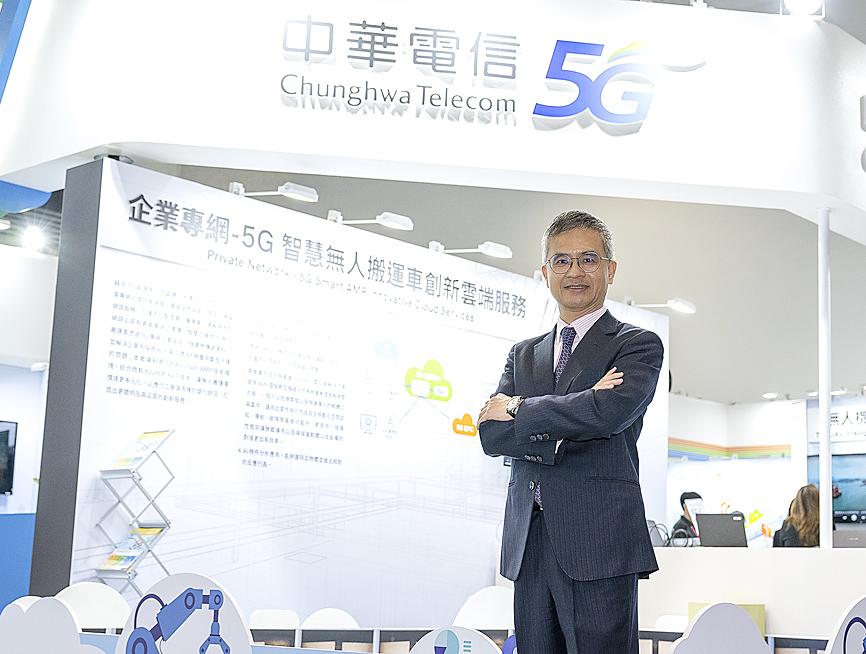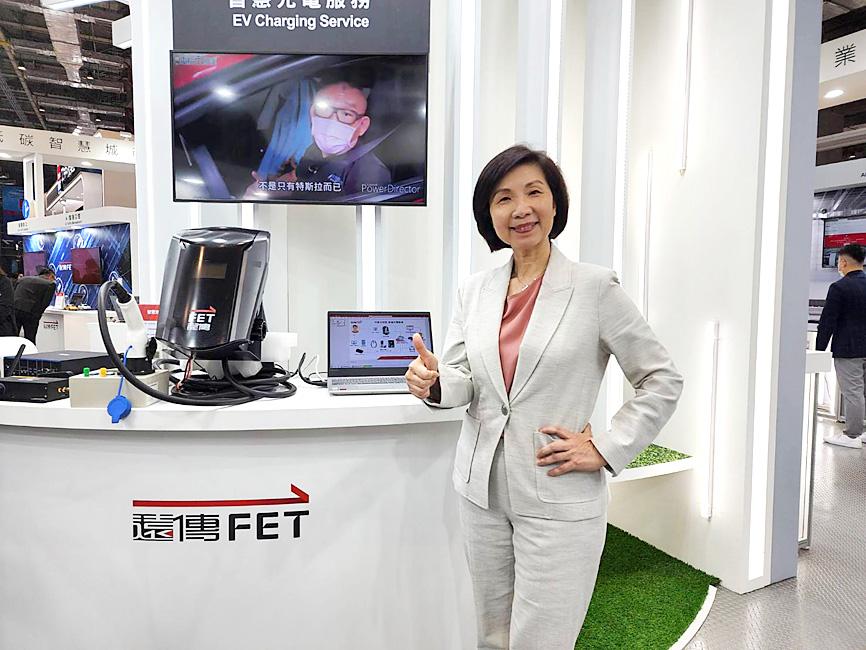Chunghwa Telecom Co (中華電信) yesterday said it aims to double the number of private networks deployed for enterprise customers this year, allowing manufacturers and logistics companies to build smart factories or automate operations.
The nation’s biggest telecom said 5G technology is a game changer, as it provides services and has the level of reliability, speed and communications coverage necessary for smart manufacturing and smart transportation, as well as other services that cannot be fulfilled using 4G technology.
With its 5G services entering their second year, Chunghwa Telecom aims for a private network revenue of NT$1 billion (US$35 million) this year, vice president Chia Chung-yung (賈仲雍) told reporters on the sidelines of the annual Smart City Summit and Expo.

Photo courtesy of Chunghwa Telecom Co
“Building private networks for enterprise customers is still an emerging business,” Chia said.
Chunghwa Telecom said it last year secured about 30 programs to help customers create private networks with dedicated 5G-enabled bandwidth and infrastructure that meet their specific connectivity needs.
The company aims to double that number this year, it said.

Photo: CNA
Revenue contribution from such services are projected to reach NT$70 billion this year, accounting for one-third of Chunghwa Telecom’s total revenue, it said.
The telecom said it provides tailor-made private networks for a wide range of sectors from manufacturing, agriculture and healthcare to steel and logistics.
Chunghwa Telecom said it has extended its services overseas. It has secured 5G-enabled private network projects from its partners in Thailand and is in talks with other customers in Southeast Asia. The company declined to disclose the names of its partners.
Separately, Far EasTone Telecommunications Co (遠傳電信) yesterday said revenue from non-telecom services, such as information and communication technology, cloud-based services and Internet of Things, is expected to grow by double-digit percentages this year from last year.
Far EasTone expects growth to come from smart city-related services, remote medical treatment and monitoring, and cloud-based digital transformation solutions, company president Chee Ching (井琪) told reporters on the sidelines of the expo.
Far EasTone yesterday showcased a new smart traffic signal uninterruptible power system (UPS) for Gogoro Inc (睿能創意), an electric scooter maker and battery swapping service provider.
The smart traffic signal UPS is equipped with two swappable Gogoro smart batteries that can maintain traffic signals for up to three-and-a-half hours, and are connected to Far EasTone’s UPS monitoring platform to perform real-time monitoring and power outage alerts, Gogoro said in a statement.
Maintenance teams can detect an outage and repair it quickly, and if the outage lasts longer, maintenance teams can swap out depleted batteries for fresh ones to extend the service time of the signal, it said.

UNCERTAINTY: Innolux activated a stringent supply chain management mechanism, as it did during the COVID-19 pandemic, to ensure optimal inventory levels for customers Flat-panel display makers AUO Corp (友達) and Innolux Corp (群創) yesterday said that about 12 to 20 percent of their display business is at risk of potential US tariffs and that they would relocate production or shipment destinations to mitigate the levies’ effects. US tariffs would have a direct impact of US$200 million on AUO’s revenue, company chairman Paul Peng (彭雙浪) told reporters on the sidelines of the Touch Taiwan trade show in Taipei yesterday. That would make up about 12 percent of the company’s overall revenue. To cope with the tariff uncertainty, AUO plans to allocate its production to manufacturing facilities in

Taiwan will prioritize the development of silicon photonics by taking advantage of its strength in the semiconductor industry to build another shield to protect the local economy, National Development Council (NDC) Minister Paul Liu (劉鏡清) said yesterday. Speaking at a meeting of the legislature’s Economics Committee, Liu said Taiwan already has the artificial intelligence (AI) industry as a shield, after the semiconductor industry, to safeguard the country, and is looking at new unique fields to build more economic shields. While Taiwan will further strengthen its existing shields, over the longer term, the country is determined to focus on such potential segments as

TAKING STOCK: A Taiwanese cookware firm in Vietnam urged customers to assess inventory or place orders early so shipments can reach the US while tariffs are paused Taiwanese businesses in Vietnam are exploring alternatives after the White House imposed a 46 percent import duty on Vietnamese goods, following US President Donald Trump’s announcement of “reciprocal” tariffs on the US’ trading partners. Lo Shih-liang (羅世良), chairman of Brico Industry Co (裕茂工業), a Taiwanese company that manufactures cast iron cookware and stove components in Vietnam, said that more than 40 percent of his business was tied to the US market, describing the constant US policy shifts as an emotional roller coaster. “I work during the day and stay up all night watching the news. I’ve been following US news until 3am

COLLABORATION: Given Taiwan’s key position in global supply chains, the US firm is discussing strategies with local partners and clients to deal with global uncertainties Advanced Micro Devices Inc (AMD) yesterday said it is meeting with local ecosystem partners, including Taiwan Semiconductor Manufacturing Co (TSMC, 台積電), to discuss strategies, including long-term manufacturing, to navigate uncertainties such as US tariffs, as Taiwan occupies an important position in global supply chains. AMD chief executive officer Lisa Su (蘇姿丰) told reporters that Taiwan is an important part of the chip designer’s ecosystem and she is discussing with partners and customers in Taiwan to forge strong collaborations on different areas during this critical period. AMD has just become the first artificial-intelligence (AI) server chip customer of TSMC to utilize its advanced